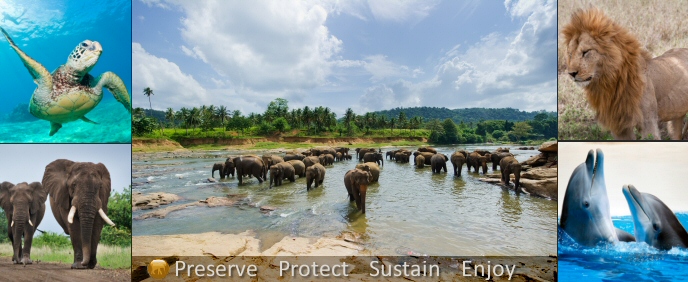
Wildlife Conservation Careers
Wildlife conservation is one of a handful of career choices that is consistently seeing steady growth. While many people think that this is because of a growing national sense of environmental stewardship, the reality is that it's much less romantic than that. There is a definite shift toward looking at things like forests and animal populations as finite resources that need management, and wildlife conservation is very much a part of that management mentality. Government and private agencies are therefore in constant need of workers that have an understanding of how wildlife populations are managed, and the ways in which various management strategies affect the overall health of an ecosystem.
Professional wildlife conservation training comes in a variety of forms, but comes primarily through college-level instruction. Most conservation scientists undergo rigorous academic training before gaining high level positions, but there is also a lot of latitude for less conventional training within this industry. "Less conventional" generally refers to extensive personal and professional experience, and is always accompanied with at least some amount of college-level education. It is also very important that wildlife conservationists have some concept of whether they are interested in working in "the field" or in a laboratory/office setting. Having this type of direction will allow someone to better direct their ambitions during college.
For example, someone desiring high-level employment at a government agency will likely need to have at least a Master's degree. They should also consider taking a mixture of environmental science and management classes. On the other hand, someone working in "the field" conducting research, enforcing conservation laws, or collecting data will be held to starkly different standards. There are many scientific field researchers that enjoy distinguished careers with nothing more than an Associates degree in environmental science. Most leading research scientists admit that they are more than happy to take researchers with less education if they are "good-natured and don't whine". The unique stresses that come with working in bad weather and uncomfortable conditions have the potential to wear greatly on most people, making durability in these conditions sometimes more desirable than high-level education.
After college, it is very important to gain practical experience in wildlife conservation to help enhance one's chances of gaining employment. Generally, this is accomplished by way of internships with active conservation organizations, and most of these internships are active during specific blocks of time. Internships will often be in support of field research and will generally be conducted during the summer, but there are also policy-based internships available for interested candidates throughout the year.
After gaining some practical, "hands on" experience, finding long-term employment becomes significantly easier. This is especially true in the areas of conservation law enforcement and field research, but can be applied to just about every wildlife conservation career.
The federal government is by far the largest employer of wildlife conservationists in the United States, and there is a wealth of opportunity there. The United States Fish and Wildlife Service has jobs available in every aspect of the wildlife conservation industry from enforcement to office management, and it maintains an extensive network of biologists and field researchers. The United States Fish and Wildlife Service also operates as an enforcement body, and it employs conservation officers to enforce the conservation laws of the United States. There are also many state, county, and city agencies dedicated to wildlife conservation. The listings of those organizations can be found on the official website of any state government.
Private sector employment in wildlife conservation is often much more competitive, but can offer much more in terms of salary and upward mobility. Private conservation organizations are often not shackled by the suffocating amount of bureaucracy that can be found in government organizations. They are also able to take on more "pure research" projects than a government agency, and they are often involved with political campaigns relating to conservation. The Natural Resources Defense Council is one of the largest employers of conservation scientists and policy analysts in the United States. Their research is centered around the conservation of natural resources, and wildlife conservation is one of their primary mandates. There are also many privately-owned companies that hire wildlife biologists to conduct environmental impact surveys on industrial projects.
